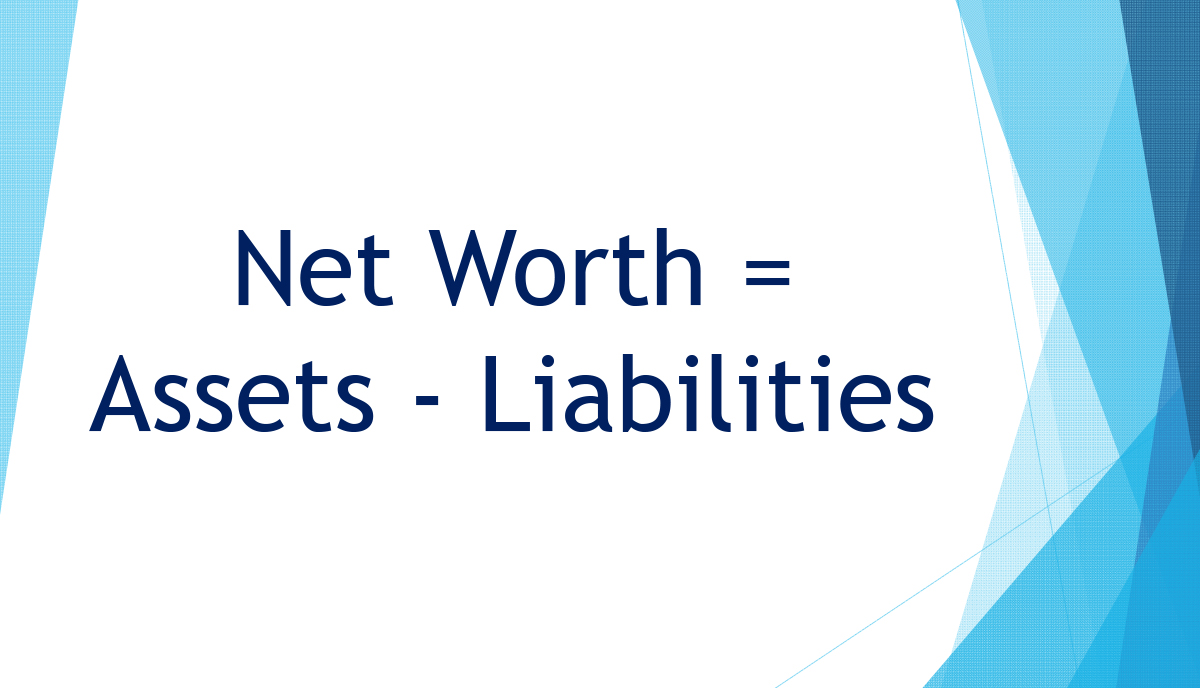The big problem with the ostrich approach is we don’t manage what we don’t measure. Net worth is a very easy thing to measure and track. It is made up of all the things you own that have a value, minus all your debts. Once all the assets and liabilities are listed, it is simple to track each item’s change in value over time.
When we want to improve, we measure how we are doing along the way. In school, we take tests to gage improvements. When I am learning a new song on the piano that is supposed to be played at 180 beats per minute, I don’t start by playing the song that fast. I must start at about 60 beats per minute and slowly increase the speed. Eventually I can play the song at 180 beats per minute as written. If you have the goal of retiring once you reach a net worth of $4,000,000, you must first, know your starting point, you must be able to see that you are progressing and you need to know when you reach your goal. Not tracking your net worth is a lot like running a race blindfolded; you can’t see where to start or where you are going, you can’t compare your progress to anyone else, and you will not know when the race is over. I think that race wouldn’t turn out too well.
Here are my five reasons it is imperative to track your net worth.
1: Net worth is the pulse of your financial health
Most doctors start their career with a negative net worth, due to a very large student loan burden. It is the equivalent of having a home loan without a house. Most new attending doctors know their net worth is negative, so they do not want to look at it and be reminded of their large financial burden.
A great milestone in a doctor’s financial life is crossing into a positive net worth; moving from owing more than you own to owning more than you owe. Achieving this milestone is cause to celebrate, because you have finally gained enough ground to call yourself broke. If you are not looking, this monumental point in time will be missed.
Your net worth is the most important vital sign of your wealth. When a trauma patient comes into the emergency department, the first thing that is checked is their vital signs. The patient’s pulse gives us an instantaneous measure of their health. If the pulse is normal, we can breathe easy and work on their injuries. If the pulse is abnormal, the medical staff quickly springs into action to save their life. Watching the patients pulse is so important that we put them on a monitor to track their pulse on a beat by beat frequency. We want to know the instant something changes.
Without a firm pulse on your financial situation, your net worth, there is nothing pushing you into action. A negative net worth should be treated with the same urgency as an abnormal pulse in the trauma room.
2: It creates motivation to improve
Just like the trauma team getting motivated by a bad set of vital signs, you will get motivated by a negative net worth. On the flip side, if you never look at your net worth, you will not be motivated to make improvements.
There is also great reward in seeing your net worth climb. When your net worth has increased by $30,000 since the last quarter, you realize you are doing the right things financially which motivates you to continue on your current path.
It was surprising to see my figures on October 1st that showed my net worth is higher than it was on January 1st. Despite a pandemic shut down, a giant dip in the stock market and making a 4% retirement distribution and paying the accompanying taxes, I still gained ground.
3: It creates motivation to get out of debt
Debt is a factor that hurts your net worth. It is especially bad if there is nothing on the plus side to counteract the debt burden. If you buy a house for $100,000 and have a debt of $80,000, you are $20,000 to the plus side on your net worth calculation. But if you borrow the money to take an expensive vacation, when you get home you have $10,000 of debt, but nothing on the books to show for it. Your net worth goes backwards by $10,000.
When you track your debts quarterly, you realize how little those easy monthly payments are contributing to pay down your debt. Since most of the payment goes toward interest, you are not making much headway. When you make extra payments or pay more than the minimum payment on debt, you see the amount of the extra payment reflected in your net worth. Every extra dollar that is used to pay off debt is one more dollar your net worth increases. That is not the case with the regular payments. Investing a dollar or using it to pay off debt has the same positive impact on your net worth.
If you are in a program that artificially decreases your student loan payments, you will see the negative effect on your net worth. The balance of those loans goes up every quarter. If you never look, you will have a surprise when one day you realize that the $200,000 you borrowed for school now has a balance due of $300,000. Backward movement is very motivating for you to stop trying to manage your debts and begin eliminating them. Get my book The Doctors Guide to Eliminating Debt for additional motivation.
4: It becomes an early warning system for problems
The reason we track instantaneous vital signs in the trauma room is to get an early warning of trouble. If we start to see the pulse going up too high, we know the patient is getting into trouble and we can act before they are dead.
The same is true with your net worth. If you see a sudden dip in your net worth, you should be able to explain what created the dip. If the explanation has a good reason, such as the stock market went down this month and it dropped your 401(k) value or you took a vacation that you have been saving for, then all is well.
But if the explanation is you went on an unplanned spending spree. You better take note of the results. If you continue in the direction you are going, you will never reach your goals. Take note of why your net worth declined and make corrections to avoid this problem in the future. Seeing the effects of your shopping trips will allow you to keep a better check on your spending.
5: It makes it easier to apply for a home mortgage
We acquired a mortgage to purchase our first house. Among the many forms we filled out to apply for the mortgage, one of the forms asked us to list all our assets and liabilities. When I got to that page I simply printed out our current net worth information from my Excel spreadsheet and wrote “see attached” on their form. If I had not been tracking my net worth, I would have spent a lot of time filling out their form. I would need to pull the records for every asset and every loan and put that information on their sheet, if I could find the information. This big time saver was an unexpected reward from tracking our net worth.
After my wife and I started tracking our net worth, we noted very few quarters where our net worth dropped, and when our net worth did go down we could easily explain its cause. Looking back at the quarterly snapshots of our net worth over our marriage we were able to identify when we crossed the finish line of saving for retirement. I then knew I was financially able to retire. I had finished the race and was able to stop running.
Do you track your net worth? Has it been helpful? What did you learn or change from the knowledge gained?
,





